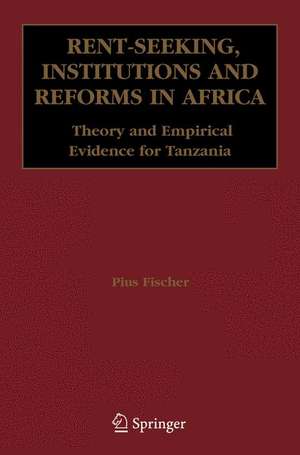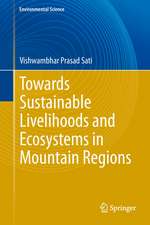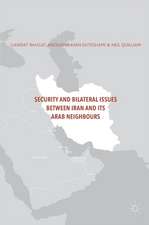Rent-Seeking, Institutions and Reforms in Africa: Theory and Empirical Evidence for Tanzania
Autor Pius Fischeren Limba Engleză Hardback – 28 sep 2006
| Toate formatele și edițiile | Preț | Express |
|---|---|---|
| Paperback (1) | 660.68 lei 6-8 săpt. | |
| Springer Us – 29 oct 2010 | 660.68 lei 6-8 săpt. | |
| Hardback (1) | 671.97 lei 6-8 săpt. | |
| Springer Us – 28 sep 2006 | 671.97 lei 6-8 săpt. |
Preț: 671.97 lei
Preț vechi: 790.56 lei
-15% Nou
Puncte Express: 1008
Preț estimativ în valută:
128.60€ • 134.09$ • 106.88£
128.60€ • 134.09$ • 106.88£
Carte tipărită la comandă
Livrare economică 20 martie-03 aprilie
Preluare comenzi: 021 569.72.76
Specificații
ISBN-13: 9780387337722
ISBN-10: 0387337725
Pagini: 682
Ilustrații: XXIV, 682 p. 47 illus.
Dimensiuni: 155 x 235 x 43 mm
Greutate: 1.29 kg
Ediția:2006
Editura: Springer Us
Colecția Springer
Locul publicării:New York, NY, United States
ISBN-10: 0387337725
Pagini: 682
Ilustrații: XXIV, 682 p. 47 illus.
Dimensiuni: 155 x 235 x 43 mm
Greutate: 1.29 kg
Ediția:2006
Editura: Springer Us
Colecția Springer
Locul publicării:New York, NY, United States
Public țintă
Professional/practitionerCuprins
Why Is Rent-Seeking Relevant for Developing Countries and Their Reforms?.- What Is Rent-Seeking?.- Evaluating Rents, Rent-Seeking Investments and Rent-Seeking Costs.- Addressing Fundamentals: Explaining the Motivation for and Success of Rent-Seeking Behaviour and Policies.- Reforms, Rent-Seeking and Rent-Seeking Opposition.- Rent-Seeking: Empirical Evidence for Tanzania.- From Socialist Ideology to Rent-Seeking Reality.- Stabilisation and Structural Adjustment in Tanzania: A Rent-Seeking Approach to Explain Reform Records.- Where Rent-Seekers Seek Rents: Parastatals—Hardliners in a Rent-Seeking Economy.- Conclusions and Policy Recommendations.
Textul de pe ultima copertă
This book identifies rent-seeking behaviour as one of the main causes of poor economic performance, observed, among other places, in many countries of Africa. Rent-seeking describes the ability to capture incomes without producing output or making a productive contribution. Since rent-seekers are often an integral part of an ailing economy and resist the adoption of reforms, understanding and anticipating rent-seeking behaviour is crucial for designing more adequate and effective policy reforms.
Following a comprehensive theoretical elaboration of the causes, properties and consequences of rents and rent-seeking strategies in the context of economic reforms and development cooperation, this book presents a detailed case study on rent-seeking within the civil service, parastatal sector and business community. It demonstrates how rent-seekers in Tanzania have systematically delayed or undermined reforms such as tax reforms, trade liberalisation, privatisation or any reforms that aim to restrain corruption and embezzlement. The case study quantifies and evaluates the rent-seeking behaviour of more than 300 parastatal companies, considering their profits and losses, the quality and timeliness of their accounting and the magnitude of support they obtained from 16 different sources.
Though it is often difficult to describe rent-seeking empirically—many aspects are hidden and obscured by all sorts of fake explanations—the study at hand explores the maze of endless, general and disaggregated information and traces as many indications of rent-seeking as possible. This broad and detailed approach makes the study unique not only for Tanzania but also within the literature on rent-seeking and development cooperation.
Following a comprehensive theoretical elaboration of the causes, properties and consequences of rents and rent-seeking strategies in the context of economic reforms and development cooperation, this book presents a detailed case study on rent-seeking within the civil service, parastatal sector and business community. It demonstrates how rent-seekers in Tanzania have systematically delayed or undermined reforms such as tax reforms, trade liberalisation, privatisation or any reforms that aim to restrain corruption and embezzlement. The case study quantifies and evaluates the rent-seeking behaviour of more than 300 parastatal companies, considering their profits and losses, the quality and timeliness of their accounting and the magnitude of support they obtained from 16 different sources.
Though it is often difficult to describe rent-seeking empirically—many aspects are hidden and obscured by all sorts of fake explanations—the study at hand explores the maze of endless, general and disaggregated information and traces as many indications of rent-seeking as possible. This broad and detailed approach makes the study unique not only for Tanzania but also within the literature on rent-seeking and development cooperation.
Caracteristici
Addresses rent-seeking in developing countries Unusually broad, detailed, and systematic coverage Brings together academic and professional perspectives


















